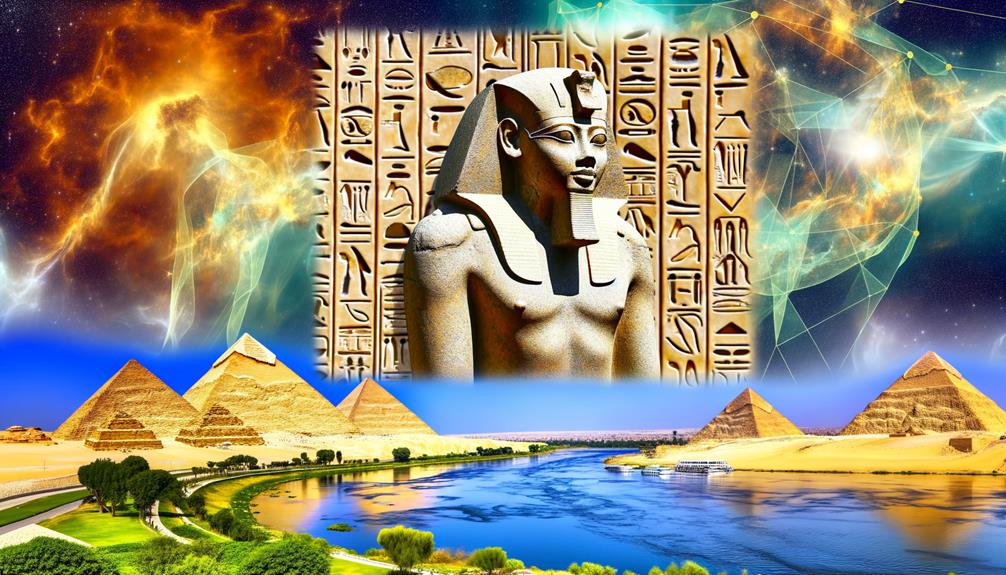Visualize standing on the lush banks of the Nile, the lifeline of ancient Egypt, where the figure of Geb, the Earth God, emerges from the earth beneath you. I'm setting out to decipher the complex mythology and symbolism associated with Geb, often portrayed as a man underneath his wife, the Sky Goddess Nut, his body adorned with green foliage. His mythology, tightly connected with the beliefs of the ancient Egyptians, uncovers a fascinating tale about the elemental forces of the universe and their influence on human life. From his part in the creation story to his descendants and reign, his rituals of worship, and his interesting connection to the Greek Titan, Kronos, there's a lot to learn about Geb's mythology. So, are you ready to step back in time, to the core of a civilization where deities roamed the earth and stars narrated tales of immortality?
Understanding Geb's Iconography
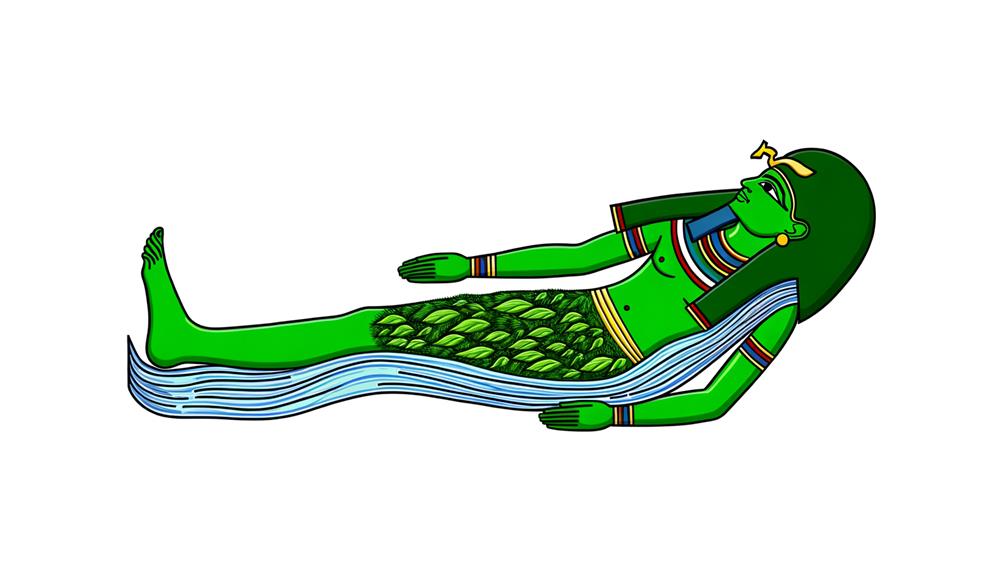
Diving into the symbolic representation of Geb, an Egyptian god, we notice his deep ties with the earth. His skin is often portrayed as green or brown, suggesting a strong bond with the fertility and vegetation of the earth. The god of the earth is typically shown as a man with green skin, sprawled on the ground with plants or crops sprouting from his body. This imagery speaks volumes about Geb's role as the backbone of the world and his authority over the earth's fertility.
Geb is often shown with a goose, snake, or bull atop his head, mirroring his control over animals and nature. This image supports the idea of Geb as the divine creator goose, a belief rooted in ancient Egyptian culture about the god's creation. Barley sheaves are another common symbol associated with this earth god, signifying his impact on fertility and the abundance of agriculture.
Ancient Egyptian art frequently features Geb alongside Nut, the sky goddess. This pairing reinforces the symbolic bond between the terrestrial world and the celestial, further cementing Geb's role as the god of the earth. A wider understanding of this symbolic representation enhances our respect for Geb's crucial role in ancient Egyptian mythology.
Geb's Role in Creation Myth
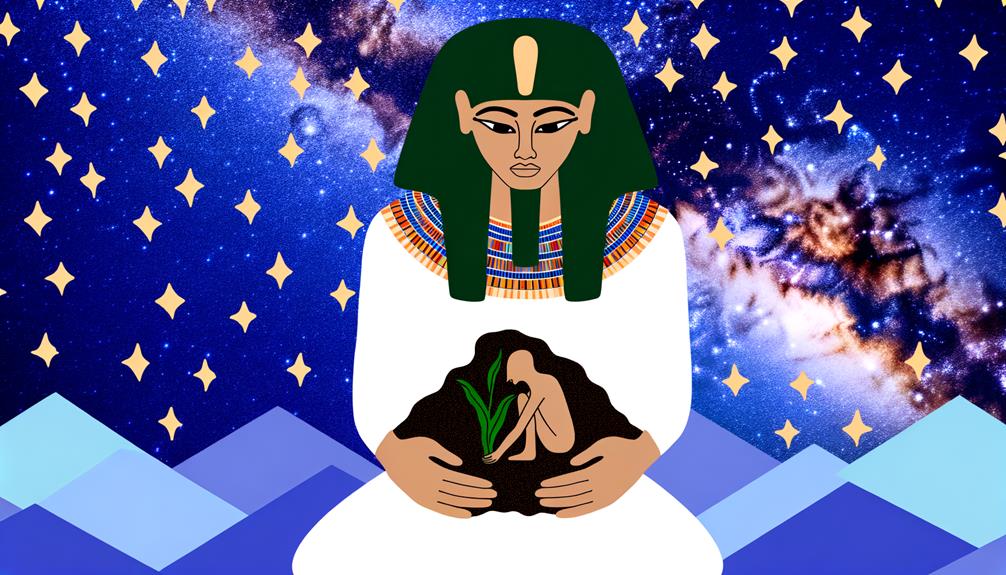
So, you're curious about Geb, the earth god, and his role in shaping the creation myth, right? Well, let's dive in! Geb, who was often portrayed in green, was the son of Shu and played a major role in the creation myth of ancient Egypt. He represented the earth and his influence was far-reaching, leaving a lasting impact on how the ancient Egyptians perceived the world.
Now, let's talk a little about his love life. Geb was married to Nut, the sky goddess. Their union was a beautiful representation of how the earth and sky are intertwined. It's also said that Geb's laughter could cause earthquakes – a clear indication of his power over earthly movements. But his influence wasn't just physical. He had a significant role in the spiritual world too. Geb was the one judging the souls of the dead in the afterlife, linking him with Ma'at, the Egyptian concept of cosmic order and justice.
But wait, there's more! Geb was also a key figure in agricultural rituals and fertility ceremonies. Imagine a green god who embodies the earth's richness and symbolizes the continuity of life and the cycle of rebirth. That's Geb for you! His influence in the creation myth went beyond just the story, deeply impacting the ancient Egyptians' beliefs, rituals, and their understanding of life and death. Pretty impressive, don't you think?
Geb's Offspring and Dynasty
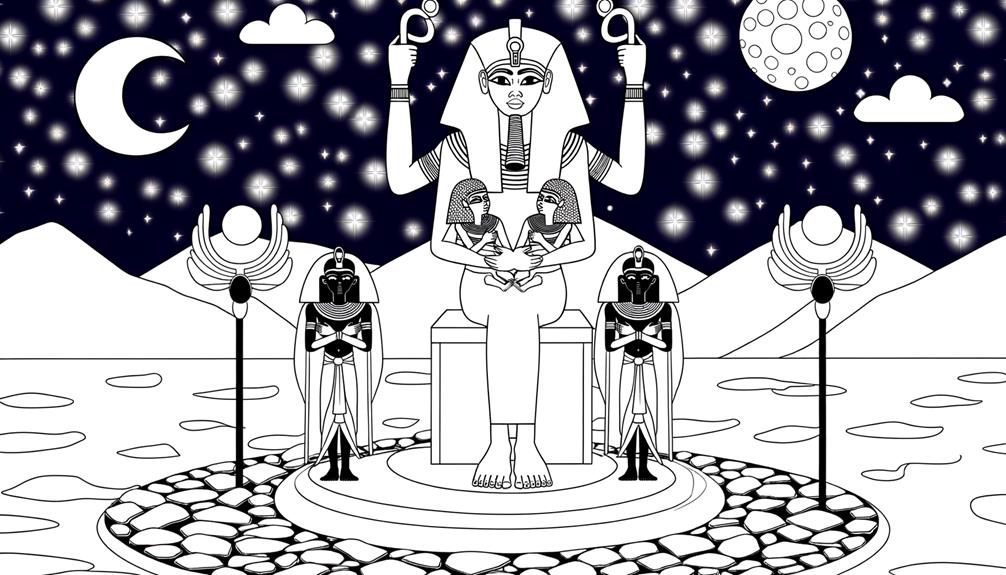
Let's chat about Geb's descendants and legacy. You'll find that his marriage with Nut, the sky goddess, brought important godly figures into the world like Osiris, Seth, Isis, and Nephthys. These children played a pivotal role in the ancient Egyptian pantheon, establishing a powerful dynasty. Geb, commonly known as the father of snakes, reigned over the earth as Nut ruled the heavens. The couple's five children are principal characters in ancient Egyptian folklore.
Here's a rundown of Geb's children and their roles:
| Child | Mother | Role |
|---|---|---|
| Osiris | Nut | God of the afterlife, death, life, and resurrection |
| Seth | Nut | God of chaos, fire, deserts, trickery, storms, envy, disorder, violence, and foreigners |
| Isis | Nut | Goddess of life, magic, motherhood, healing and the protection of the king |
| Nephthys | Nut | Protective goddess of the dead, mourning, night, rivers, sleep, and childbirth |
The Book of the Dead, an ancient Egyptian text used in funerals, often cites Geb. It holds that the pharaohs, who represented Geb on earth, sat on 'the throne of Geb.' This association ties Geb's name closely with the leadership of ancient Egypt.
Worship Practices for Geb
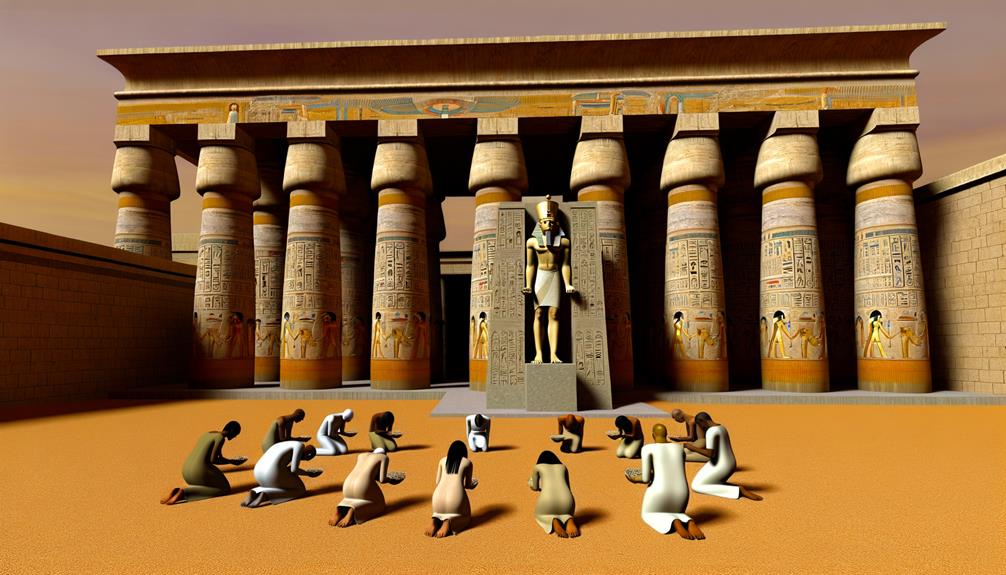
Worshipping Geb, the Earth god of the Egyptian pantheon, was no simple task. It was rooted in ancient practices and rich in symbolism, reflecting the god's key role in the ancient Egyptian faith.
Have you ever heard of the ritual where Geb is portrayed as the 'lame one'? This isn't an insult. It's a symbol of the Earth's immobility. Just think about it – the Earth is solid, unchanging, the very foundation upon which our world stands. That's Geb. He's the steady, unchanging grounding of our world.
Did you know that Geb was also known as the 'House of Geb'? It's an intriguing metaphor, isn't it? It's the idea of Earth as a home for all living creatures. And guess what? Geb wasn't just the Earth god; he was also the twin brother and husband of the sky goddess Nut.
Another interesting tidbit – Osiris, the god of the dead, was Geb's son. This connection between Geb and Osiris underscores the Earth god's role in the Egyptian faith. There were even ceremonies that honored Geb as the divine link between the mortal world and the afterlife. This association only underscored his importance in the cycle of life and death.
Geb's Relation to Greek Kronos
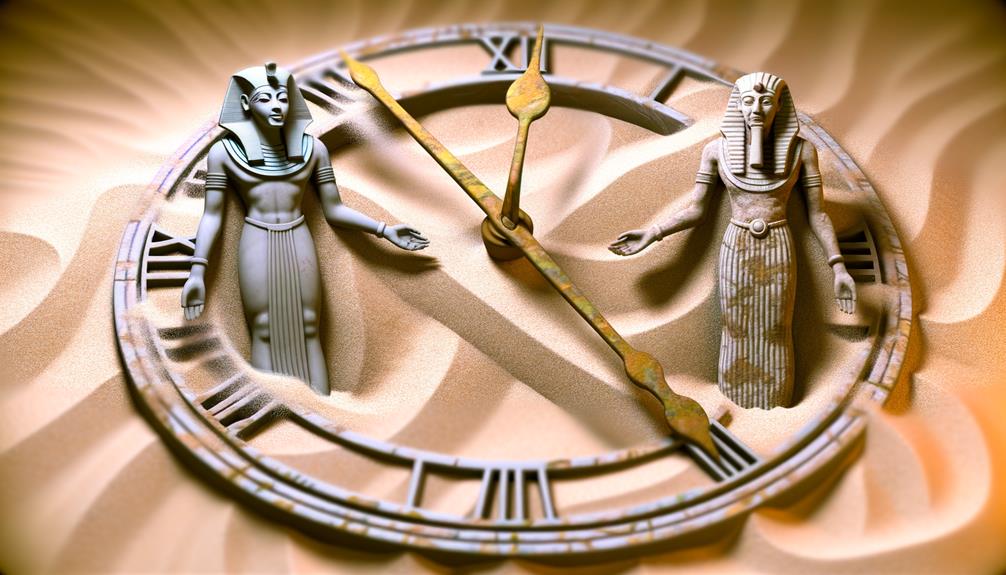
Looking into the worship and symbolism of Geb offers a peek into the complex world of ancient Egyptian gods. However, it's just as intriguing to see the similarities he shares with the Greek Titan Cronus. Both are big deals in their own mythologies. They're like the celebrity figures of their divine worlds, symbolizing the earth and its fruitfulness in both Egyptian and Greek stories.
In this part of the article, we'll point out three specific resemblances:
- Geb is often seen as the Egyptian equivalent of Cronus. This suggests that Greek and Roman influences were mixed into Egyptian culture.
- Both gods are tied to the earth and its life-giving powers. This shows how much the old societies respected and revered nature.
- They're also associated with certain symbols – Geb with the goose, and Cronus with the sickle. These symbols stand for divine creation and provision.
These similarities aren't just random. They show how ancient civilizations and their mythologies were connected, showing a common human desire to make sense of the world. In the connection between Geb and Cronus, we can see a reflection of what our ancestors believed, showing the lasting influence of mythology.
Frequently Asked Questions
What Is Gebs Backstory?
So, you're curious about Geb, huh? Well, let me fill you in. Geb is a pretty important figure in ancient Egyptian mythology. You could say he's the god of the earth. He's married to Nut and together, they have four children – Osiris, Seth, Isis, and Nephthys. But that's not all. Geb does a lot more than just being a family man. For starters, he has the hefty responsibility of separating the earth and the sky. On top of that, he's the one who judges souls. Oh, and did I mention he's associated with fertility? So yeah, Geb's a pretty big deal.
Is Geb the God of Earth?
Absolutely, it's true to say that Geb is recognized as the God of the Earth in the lore of ancient Egypt. He is typically linked with things like fertility and farming, as well as natural events such as earthquakes.
What Is Geb in Mythology?
Let's chat about Geb, a fascinating character from mythology. If you delve into ancient Egyptian stories, you'll find him there, portrayed as the god of earth. He's a symbol for the physical world around us. But that's not all – Geb had a pretty serious job, too. He would pass judgement on souls in the afterlife. Quite the multi-tasker, isn't he? He played an array of other key roles as well.
Who Is Geb in the Bible?
So, you're curious about Geb in the Bible? Actually, there's a slight misunderstanding here. You won't find Geb in any biblical verses – Christian or Jewish. Geb hails from ancient Egyptian mythology, where he's revered as a god symbolizing the earth. Just a minor confusion there, no big deal!

